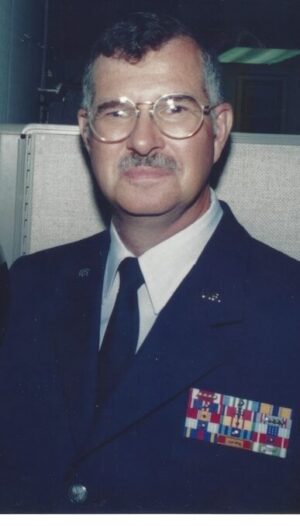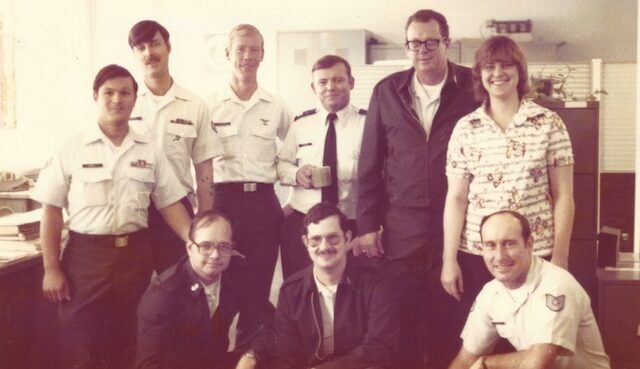Over the course of a 28-year career as an administrator for the Air Force, Ernest “Skip” Dalle Molle came to realize the key role that helping people played in so many of his job descriptions.
One of five children, Ernest “Skip” Dalle Molle was born in Evergreen Park to Ernest and Mary (Bertoletti) Dalle Molle. He grew up in the Roseland neighborhood of Chicago surrounded by his large, extended family: Some were down the block, his maternal grandparents were four blocks away and others lived within eight miles. Dalle Molle’s paternal grandparents emigrated from Lugo di Vincenza, and his maternal side was from Bergamo.
Every Sunday, Dalle Molle and his family attended Mass at St. Anthony Church. His parents and siblings drove home while he walked, stopping at Connie’s, a little Italian shop along the way. “My job was to pick up the salami and the ciope,” Dalle Molle says. “I would come home with a bag. Ciope were like rolls, knot-shaped, maybe 15 or 20 of these along with the salami, maybe soppressata and other things. I would come home and the family would just kind of graze.”
Dalle Molle remembers vegetables coming from everyone’s gardens and wine being made with homegrown grapes. “A lot of our neighbors had come from Italy,” he says. “My mom and dad would talk with them and they would all get together. It was a commonality and a sharing.”
He graduated from St. Anthony Grade School and attended Mendel Catholic High. While still in school, 17-year-old Dalle Molle spoke to a military recruiter. “I had a wandering spirit,” he says, “and I did not like school.” After asking Dalle Molle his age and if he had graduated, the recruiter told him, “You come back here after high school and I’ll talk to you, but not before.”
Dalle Molle graduated in 1967 and enlisted in the U.S. Air Force, influenced partly by an uncle, a gunner during World War II, who shared stories and photos. While in school, Dalle Molle worked various jobs in a bank and retail, using a cash register, typewriter and other office machines. His older cousins advised, “Make sure you sign up for what you want to do and what you’re qualified to do.” Dalle Molle chose the Administrative Field and entered active duty in October 1967.
 He completed basic training at Lackland Air Force Base in Texas and because he had a “bypass” from advanced training due to his administrative skills, received a Direct Duty Assignment. After a two-week leave, Dalle Molle reported to Grand Forks, North Dakota, assigned to the 321st Missile Maintenance Squadron. Dalle Molle was surprised to see a stack of books on his desk. It was training material. “What I quickly learned at that point was to get anywhere, to do anything, I had to learn; I had to grow,” he says. “There was always going to be training.”
He completed basic training at Lackland Air Force Base in Texas and because he had a “bypass” from advanced training due to his administrative skills, received a Direct Duty Assignment. After a two-week leave, Dalle Molle reported to Grand Forks, North Dakota, assigned to the 321st Missile Maintenance Squadron. Dalle Molle was surprised to see a stack of books on his desk. It was training material. “What I quickly learned at that point was to get anywhere, to do anything, I had to learn; I had to grow,” he says. “There was always going to be training.”
Dalle Molle worked as an Administrative Clerk in Operational Maintenance, Vehicle Maintenance and the Orderly Room in Squadron Headquarters. Approximately 150 missiles were stockpiled in the surrounding area. The mission of the squadron was to ensure that the missiles were maintained and in a ready state for operational needs. He would also do any kind of administrative task to assist the members of his squadron, Dalle Molle says, helping them obtain meal cards, doctor appointments, passes and leaves. “You’re not only doing the paperwork but you’re helping to teach and take care of the people,” he says.
In February 1970, after completing weapons training, Dalle Molle reported to Saigon, where he was assigned to Headquarters Military Assistance Command Vietnam, MACV, as a clerk typist. “The office I was in was the one where all the selecting and targeting and sending out of orders to the bases for the B-52s took place,” he says.
With information garnered from Intelligence, Dalle Molle typed orders for air strikes giving “coordinates and things of that nature,” which were taken to the Communications Center. Encrypted orders were then dispatched to B-52 bases. In any given 24-hour period, typically three bombers at a time took off on their mission. Roughly three dozen B-52s were deployed at different times and locations throughout the day. After the air strikes, the bombers returned to their home bases and reported back to Intelligence, who determined if the missions had been successful.
Dalle Molle was stationed in Vietnam for 18 months and figures he typed orders for 18,144 B-52 air strikes. “I sometimes think of that like my weapon … and strange as it may seem, am still haunted by the damage and potential lives that were taken because of those orders we sent out.” Dalle Molle pauses, then adds, “I sometimes wondered if it would have been easier to hold a rifle.”
He references a quote from “The Wisdom of Compassion” by the 14th Dalai Lama. The words were spoken by a man from Northern Ireland imprisoned for violent acts who sought to help his community after his release. “‘But I am unable to find inner peace; I think that is the price you pay for being involved in violence,’” Dalle Molle recounts. “The one thing I learned is that combat is one thing and support is another, and yet they’re the same.”
Dalle Molle reenlisted while in Vietnam and was next assigned to Cannon Air Force Base in Clovis, New Mexico, attached to the 27th Tactical Fighter Wing/832nd Air Division, Command Center. While there, Dalle Molle reconnected with his high school girlfriend, Barbara Ann Piech, who was stationed with the Army in Washington, D.C. Learning of her current assignment, he applied for and received the position of Administrative Supervisor for the Defense Language Institute, East Coast Branch, in Washington, D.C.
Eventually the Language Institute moved to the West Coast, shutting down a number of foreign-language programs, with many foreign nationals remaining in D.C. “I was holding the hands of a lot of very intelligent people and working in a stressful environment,” Dalle Molle says.
He transferred to the 1138th Procurement Squadron, which supported all the Air Force units in the D.C. area. “Any contract that was written went through these folks, any buying that was needed went through these folks,” Dalle Molle says, “so it was a major, major operation.”
He eventually advanced from the contract maintenance shop to the main operation center. “We maintained contracts, bidding and all the other stuff that we were responsible to take care of,” says Dalle Molle. “So you had kind of a small outfit but with major responsibilities behind it.”
While stationed in D.C., Dalle Molle married Piech, who transferred into the Air Force. Rising through the ranks, Dalle Molle advanced to an administrative supervisor covering all levels of organization. After serving for nine years, he entered Manpower School in 1976.
Active in the Boy Scouts as a child, Dalle Molle continued into adulthood. “On the Air Force side, that’s one of the things you get rated on, your community involvement,” he says. Dalle Molle participated in scouting programs while off-duty and became Assistant District Commissioner for the Anacostia area of D.C.
It was during that time that he assisted the foreign nationals. “I began to realize that much of my role in life is to help people,” Dalle Molle says. “I was able to do it while in uniform and that seemed to give me a different sense about myself.” With that revelation, he chose the Air Force as his career.
He served 19 years in Manpower, conducting studies of time and motion. His first assignment was at Hahn Air Base in Germany. “The neat thing about going into the manpower world was that on a given installation I was responsible for determining requirements, both peace- and wartime, for the security police, for the communications guys, for the guys that did the bomb depot, munitions and things of that nature,” Dalle Molle says. His duties allowed him to see the Air Force as a whole. “If you’re a manpower guy you need to understand the whole in order to understand how any one section that you’re looking at affects the missions,” says Dalle Molle.
His assignments took him to Germany, Panama, Colorado, Texas and Washington, D.C., where he was stationed at the Pentagon. He started at Administrative Specialist and advanced to Manpower Technician, Superintendent of a Manpower Functional Team, Program Manager, Wing Manpower Office Supervisor, and finally Chief of the Manpower and Civilian Personnel Division (AF Personnel Center), a position he retired from in 1995 at the grade of Chief Master Sergeant.
His duties included managing manpower requirements throughout the Air Force, editing regulations for Air Force civilian personnel management, directing development of support agreements between the U.S. Army and Navy to consolidate base support activities in Panama, and directing command level manpower and civilian personnel.
He received a Bachelor of Arts in industrial management and, after retiring from the military, pursued his theology studies and earned a Master of Arts in pastoral ministry. Following his path to help people, Dalle Molle has worked or volunteered as a hospital and fire-service chaplain and Red Cross caseworker and spiritual-care provider, and assisted in building and rebuilding homes and lives after disasters with Habitat for Humanity.
He cherishes memories of escorting the widow and two young daughters of Staff Sgt. John Blessinger, whose AC-130 Spectre Bird plane was shot down during the First Gulf War. He stayed with the family, guiding and assisting them throughout the weekend events. “I just kind of realized, your role is to take care of these people,” Dalle Molle says.
He also fondly remembers family friend Mario Avignone, writer of Fra Noi’s Petals from Roseland column, sending monthly packages to Dalle Molle while he was in Saigon. They included a copy of the local paper, candy and a crisp $1 bill with a note telling Dalle Molle that he and others in the community were thinking about them. “Knowing Mario had served in World War II made the gift a treasure,” he says.
Reflecting on his own career, Dalle Molle says, “They took an immature 18-year-old, they gave him a place to grow up, they gave him a place to learn, they gave him a place to get educated and they gave him a place to help and to serve people.”
The above appears in the March 2024 issue of the print version of Fra Noi. Our gorgeous, monthly magazine contains a veritable feast of news and views, profiles and features, entertainment and culture. To subscribe, click here.
 Fra Noi Embrace Your Inner Italian
Fra Noi Embrace Your Inner Italian







